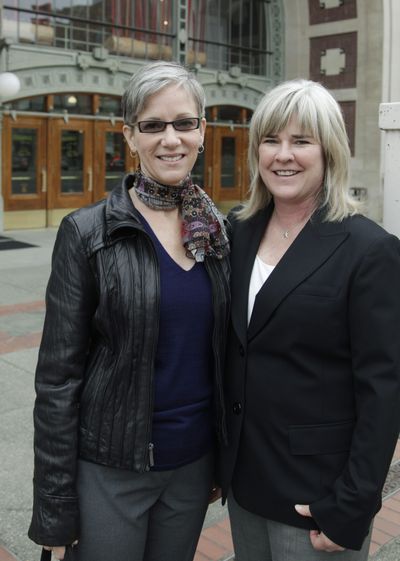Witt takes stand in case contesting discharge
Lawyer probes former Air Force nurse’s past

TACOMA – Margaret Witt, a decorated Air Force flight nurse from Spokane, said she was “absolutely shocked” when a military lawyer said she was under investigation for homosexual conduct.
Taking the stand Monday in U.S. District Court where she is contesting her 2006 discharge under the military’s “don’t ask, don’t tell” policy, Witt said she was asked about her female roommate by a military lawyer in late 2003.
She said her understanding of the policy was she believed the military couldn’t ask and she wasn’t supposed to tell. She didn’t acknowledge she was gay during that investigation, but was later suspended from her Air Force Reserve unit, the 446th Air Evacuation Squadron at McChord Air Force Base. She appealed, but didn’t get a hearing for almost two years. After that hearing she was given an honorable discharge; she’s suing to be reinstated.
“I have skills and I haven’t been able to use them,” said Witt, who sometimes cried on the stand. “It kills me not to be there.”
After she and her longtime partner separated in the fall of 2003, Witt said she began a relationship with a married co-worker at Spokane Public Schools, where she worked as a physical therapist. She acknowledged that the woman, Laurie McChesney, had not yet separated from her husband, although the couple eventually divorced and Witt and McChesney now live together in Spokane.
“Although I don’t regret our relationship … I do very much regret the way I handled it in the beginning and apologize for that.”
One of the ways the military discovered Witt was gay was because McChesney’s husband, Pat, wrote a letter of complaint to one of her commanders.
Under cross-examination by federal attorney Peter Phipps, Witt acknowledged that a military officer is expected to lead by example and have high integrity.
“And you understand that adultery is not consistent with a high standard of integrity?” Phipps asked.
“Yes,” Witt replied.
When she entered the Air Force in 1987, she didn’t consider herself a lesbian, Witt said. “I didn’t label myself anything,” and she dated men as well as women through the early 1990s. When the military established the don’t-ask-don’t-tell policy under the direction of Congress in 1993, she did consider herself a lesbian, although she said it isn’t her favorite term.
“It sounds like ‘alien’ to me,” she said.
She didn’t tell her parents the reason for her suspension in 2004, and didn’t tell them she was gay until 2006, on the eve of the press conference announcing her lawsuit. “They’ve been behind me the whole time. That’s been the best thing to come out of this.”
Witt told U.S. District Judge Ronald Leighton that by being involuntarily discharged after 18 years in the military, she lost her pension and other benefits that are eligible to people who serve 20 or more years. She currently works at the Veterans Affairs Medical Center in Spokane.
Elizabeth Kier, an associate professor of political science at the University of Washington who has studied military policy, said Monday afternoon that there’s no basis for the theory that having gays and lesbians in the ranks is a problem for a unit’s ability to do its work.
She likened current comments that gays serving openly could affect morale or military capabilities to similar warnings about integrating the armed forces in the 1940s. Some 96 percent of officers said they expected integration to fail, but all studies showed it had no negative effects.
“Integrating gays and lesbians will be a cakewalk compared to integrating African-Americans,” Kier said.
Under questioning from federal attorney Steve Buckingham, who noted the military was merely following a law passed by Congress, Kier was asked if she’d like to see the policy repealed.
“Yes, I would,” she replied.